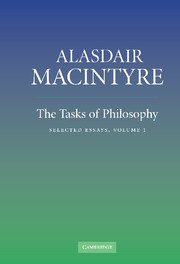Book contents
- Frontmatter
- Contents
- Preface
- Acknowledgments
- PART I DEFINING A PHILOSOPHICAL STANCE
- 1 Epistemological crises, dramatic narrative, and the philosophy of science
- 2 Colors, cultures, and practices
- 3 Moral relativism, truth, and justification
- 4 Hegel on faces and skulls
- 5 What is a human body?
- 6 Moral philosophy and contemporary social practice: what holds them apart?
- PART II THE ENDS OF PHILOSOPHICAL ENQUIRY
- Index
6 - Moral philosophy and contemporary social practice: what holds them apart?
Published online by Cambridge University Press: 05 June 2012
- Frontmatter
- Contents
- Preface
- Acknowledgments
- PART I DEFINING A PHILOSOPHICAL STANCE
- 1 Epistemological crises, dramatic narrative, and the philosophy of science
- 2 Colors, cultures, and practices
- 3 Moral relativism, truth, and justification
- 4 Hegel on faces and skulls
- 5 What is a human body?
- 6 Moral philosophy and contemporary social practice: what holds them apart?
- PART II THE ENDS OF PHILOSOPHICAL ENQUIRY
- Index
Summary
Contemporary academic analytic moral philosophy is a relatively flourishing sub-discipline. Its internal debates are conducted at more than one level: some concern the semantics or the epistemology of moral claims; in others rival standpoints on substantive normative and evaluative issues are matched against each other; and in a third type of discussion issues arising in other philosophical areas – concerning, for example, personal identity, the nature of rule-following or of agency – are brought to bear on normative and evaluative problems. But at all three levels the focus is provided by a limited set of central conceptions, the status of and relationships between which provide the theorizing of the moral philosopher with her or his subject matter: the right and the good, and more particularly justice and rights, utility and the virtues. Yet of course academic moral philosophy is not the only or the most important place where we encounter such conceptions. For they inform the idioms and the modes of practice of a great deal of everyday social life.
Within those small- and large-scale organized corporate spheres, in which most working days are spent, as well as in the family and in a range of voluntary organizations, complaints are framed in terms of invasions of rights, colleagues, subordinates, and superiors are evaluated by ascribing virtues and vices, and policies are advocated or impugned in cost-benefit terms which involve some measure of utility.
- Type
- Chapter
- Information
- The Tasks of PhilosophySelected Essays, pp. 104 - 122Publisher: Cambridge University PressPrint publication year: 2006
- 4
- Cited by

